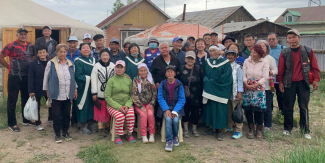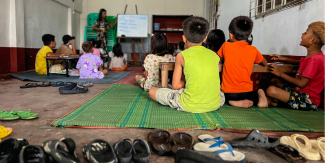July 5, 2023 - GUSTAVO A. CROCKER

During one of the first international Nazarene Compassionate Ministries seminars on poverty alleviation, I was challenging the participants to mobilize as the healing hands of Jesus. A well-intended believer told me that social ministry was a distraction for the evangelizing work of the church—after all, Jesus Himself reminded us that the poor will always be with us. If that were true, we should stop trying to solve the problem of suffering and focus on evangelism.
I couldn't disagree more. The reality of the gospel is that it is good news for the whole person in the whole world. While Jesus did rebuke the disciples’ false solidarity in what they thought was a waste of money that could have been given to the poor, Jesus was not making light of the reality of poverty, oppression, and exploitation. The disciples were simply putting things out of context. What Jesus told them was that a true act of mercy and justice couldn’t be done in isolation from Him, the source of justice and righteousness.
Besides, from His declaration of mission in Luke 4 to His description of the end of times in Matthew 25, Jesus placed the oppressed at the center of His mission, message, and ministry. His ministry model was to the whole person. When traveling across the villages and communities preaching, teaching, and healing, Jesus was moved to compassion because He saw the people harassed and hopeless, experiencing emotional, spiritual, and physical poverty. The last, the least, and the lost had a special spot in Jesus’ heart; the incarnate God called His disciples to see Him in those who were marginalized (Matthew 25). He challenged the religious practices void of solidarity, giving a contemporary recitation of the message given to the people through the prophet Isaiah in chapter 58. It is interesting that in this rebuke to the religious symbolism void of solidarity, the Lord is encouraging us to address both absolute and relative poverty: spiritual and social poverty. He is asking us to work both in the alleviation of suffering (by sharing our resources) and biblical justice (by speaking up). The message of Jesus is a message of restoration—of God’s people with their Creator, and of God’s people to a full life the way He intended.
In the small Nazarene church in Guatemala where my parents found the saving grace of Jesus, the grace and compassion of Christ was not only preached in word but also demonstrated in deed. It was a church that was established to be with the poor and the lost. And it was also a church that, since its beginnings, had been established to minister to and embrace the poor while preaching and embodying holiness. That’s why I was thankful when my experience of a church that stands for the poor became part of the polity beyond a statement or a declaration.
You can find it in the Manual of the Church of Nazarene (p. 394), an excerpt of which reads: (We) believe that Jesus commanded His disciples to have a special relationship to the poor of this world; that Christ’s Church ought, first, to keep itself simple and free from an emphasis on wealth and extravagance, and second, to give itself to the care, feeding, clothing, and shelter of the poor. Throughout the Bible and in the life and example of Jesus, God identifies with and assists the poor, the oppressed, and those in society who cannot speak for themselves. In the same way, we, too, are called to identify with and to enter in solidarity with the poor and not simply to offer charity from positions of comfort. We hold that compassionate ministry to the poor includes acts of charity as well as a struggle to provide opportunity, equality, and justice for the poor. We further believe that the Christian responsibility to the poor is an essential aspect of the life of every believer who seeks a faith that works through love.
...And that's why we are a compassionate church...
---
Taken from the latest issue of NCM Magazine. Read online here.





